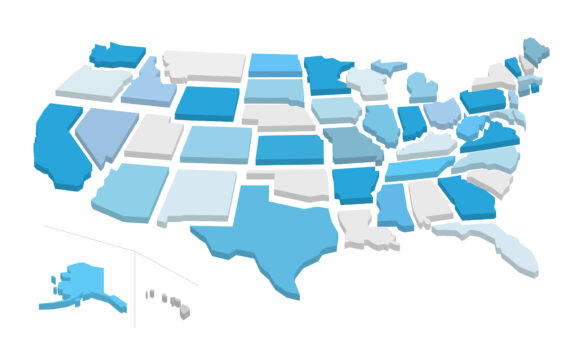

Oh, how things vary from state to state. This is particularly true when it comes to insurance laws.
As insurance professionals know well, variations in state governance and regulation extend to the insurance space, with each state having its own insurance department charged with regulating the industry.
Of course, state laws impact the insurance business in its entirety. Nonetheless, this commentary is focused on rules targeted at producers; more specifically, the fees they can seek for services rendered.
Broker-Agent Fees: A Brief Overview
The legal duties, obligations and rights of brokers acting on behalf of insureds versus agents representing insurance companies differ, most notably, in California, New York, and certain other states like Texas, and especially as they relate to fees that customers can be charged.
Typically, for producers working at the direction of those seeking insurance coverage, the ability to charge fees is subject to a small handful of caveats. In California, only insurance pros that are licensed as brokers-agents, appropriately bonded, and acting in the capacity of a broker can impose fees directly upon insureds. To do so, they must provide customers with written fee agreements and broker fee disclosure forms (for personal lines) that fully and transparently disclose the fees being charged. Likewise, the amounts imposed by brokers in the Golden State must be reasonable and are subject to a given insured’s prior written consent.
On the other hand, an agent in California or, say, New York, who is appointed by an insurer cannot charge fees related to the procurement of insurance that are not part of the carrier’s rate filing. Instead, agents’ compensation in those states is limited to commissions from carriers based upon premium produced. But as illustrated below and depending on particular state laws, agents in other places like Texas can command fees.
In all cases, broker — and, where applicable, agent — fees must fall within the parameters of state-specific regulatory restrictions, some of which impose fee caps and others that do not permit fees whatsoever. It is important to emphasize that where broker or agent fees are permitted, producers should never combine them with premium into a lump sum. Likewise, brokers should steer clear of representations that premium quoted includes fees. As a matter of practice, broker or agent fees must be clearly delineated to the customer.
How Much Can Producers Charge?
The amounts brokers — or in certain states, agents — can seek in fees vary depending upon geography and the types of coverage being placed (personal or commercial lines).
Some states specifically limit the amount or type of fees that can be charged. A good illustration can be found on the East Coast, where in New Jersey, as of this writing, there is an aggregate ceiling of $20 for all fees charged per policy in any given year. Yet miles away in New York, licensed insurance brokers, but not agents, can charge fees deemed to be reasonable.
That is not the case in Texas, where agents can charge fees either in lieu of or in addition to the commissions they earn. As a rule, these fees relate to the sale of a policy (read: taking it to market or an application fee). Significantly, like in California, New York, and so many other jurisdictions, Texas requires disclosure be made to customers of the fees to be charged. Agents in the state must also describe the method by which their commissions are calculated.
Bottom line: there is no consistent through line to the amounts and circumstances under which producers may charge customers fees. Where permissible, fees can range from the statutory set amounts to sums deemed reasonable based on services provided.
No doubt, brokers and agents must understand the playing field when it comes to the fees they can impose upon insureds, as well as relevant disclosure requirements that must be adhered to. And to the extent those sums and mandates are set forth in a patchwork of 50 separate sets of complex statutes or regulations, producers should work with qualified counsel for clarification in order to avoid any adverse legal implications.
The business of insurance is very much dependent upon state law, which can make things difficult for producers, especially those licensed in multiple jurisdictions. No matter the challenge, brokers and agents alike must be mindful of state-specific differences when it comes to all of their professional activities, including the amounts (if any) they can charge customers for broker or agent fees.
Robinson is founding partner of Michelman & Robinson LLP, a national law firm headquartered in Los Angeles. Phone: 310-299-5500. Email: mrobinson@mrllp.com.
Was this article valuable?